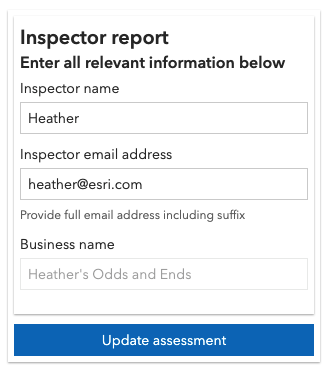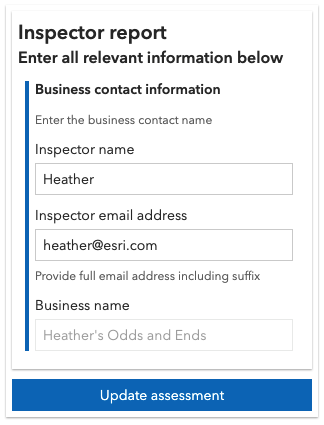GroupElement
require(["esri/form/elements/GroupElement"], function(GroupElement) { /* code goes here */ });esri/form/elements/GroupElementA GroupElement form element defines a container that holds a set of form elements that can be expanded, collapsed, or displayed together. This is the preferred way to set grouped field configurations within a feature form's or feature layer's formTemplate.
| Form with individual field elements | Form with grouped field elements |
|---|---|
 |  |
Nested group elements are not supported.
- See also:
const fieldElement1 = new FieldElement({
fieldName: "inspector",
label: "Inspector name"
});
const fieldElement2 = new FieldElement({
fieldName: "inspdate",
label: "Inspection date",
description: "Date inspection was handled",
input: { // autocastable to DateTimePickerInput
type: "datetime-picker",
includeTime: true,
min: 1547678342000,
max: 1610836742000
}
});
const fieldElement3 = new FieldElement({
fieldName: "placename",
label: "Business name",
editable: false
});
// Create the group element and pass in elements from above
const groupElement = new GroupElement({
label: "Business contact information",
description: "Enter the business contact name",
elements:[fieldElement1, fieldElement2, fieldElement3]
});
// Next pass in any elements to the FormTemplate
const formTemplate = new FormTemplate({
title: "Inspector report",
description: "Enter all relevant information below",
elements: [groupElement] // Add group element to the template
});Constructors
- new GroupElement(properties)
- Parameter:properties Objectoptional
See the properties for a list of all the properties that may be passed into the constructor.
Property Overview
| Name | Type | Summary | Class | |
|---|---|---|---|---|
| String | The name of the class. more details | more details | Accessor | |
| String | The element's description providing the purpose behind it. more details | more details | Element | |
| FieldElement[] | An array of field elements to display as grouped. more details | more details | GroupElement | |
| String | Defines if the group should be expanded or collapsed when the form is initially displayed. more details | more details | GroupElement | |
| String | A string value containing the field alias. more details | more details | Element | |
| String | The type of the element. more details | more details | GroupElement | |
| String | A reference to an Arcade expression that returns a boolean value. more details | more details | Element |
Property Details
The name of the class. The declared class name is formatted as
esri.folder.className.
The element's description providing the purpose behind it.
- elements FieldElement[]autocast
An array of field elements to display as grouped. These objects represent an ordered list of form elements.
- initialState String
Defines if the group should be expanded or collapsed when the form is initially displayed. If not provided, the default value is expanded.
Possible Value Description collapsed The grouped elements appear collapsed. expanded The grouped elements appear expanded. Possible Values:"collapsed"|"expanded"
- Default Value:expanded
A string value containing the field alias. This is not to Arcade expressions as the title is used instead.
- type String
The type of the element. GroupElement is of type,
group.For GroupElement the type is always "group".
A reference to an Arcade expression that returns a boolean value. When this expression evaluates to
true, the element is displayed. When the expression evaluates tofalsethe element is not displayed. If no expression is provided, the default behavior is that the element is displayed. Care must be taken when defining a visibility expression for a non-nullable field i.e. to make sure that such fields either have default values or are made visible to users so that they can provide a value before submitting the form.The referenced expression must be what is defined in the form template's expressionInfos. It cannot be set inline within the element object.
Example:// Expression created within ExpressionInfos and is referenced in element const expression = new ExpressionInfo({ name: "alwaysHidden", expression: "1 == 0" }); // Reference an already-defined visibilityExpression set within the ExpressionInfos const fieldElement = new FieldElement({ type: "field", fieldName: "inspemail", label: "Email address", visibilityExpression: "alwaysHidden" });
Method Overview
| Name | Return Type | Summary | Class | |
|---|---|---|---|---|
| GroupElement | Creates a deep clone of the GroupElement class. more details | more details | GroupElement | |
| * | Creates a new instance of this class and initializes it with values from a JSON object generated from a product in the ArcGIS platform. more details | more details | Element | |
| Object | Converts an instance of this class to its ArcGIS portal JSON representation. more details | more details | Element |
Method Details
- clone(){GroupElement}
Creates a deep clone of the GroupElement class.
Returns:Type Description GroupElement A deep clone of the GroupElement instance.
- fromJSON(json){*}static
Creates a new instance of this class and initializes it with values from a JSON object generated from a product in the ArcGIS platform. The object passed into the input
jsonparameter often comes from a response to a query operation in the REST API or a toJSON() method from another ArcGIS product. See the Using fromJSON() topic in the Guide for details and examples of when and how to use this function.Parameter:json ObjectA JSON representation of the instance in the ArcGIS format. See the ArcGIS REST API documentation for examples of the structure of various input JSON objects.
Returns:Type Description * Returns a new instance of this class.
Converts an instance of this class to its ArcGIS portal JSON representation. See the Using fromJSON() guide topic for more information.
Returns:Type Description Object The ArcGIS portal JSON representation of an instance of this class.